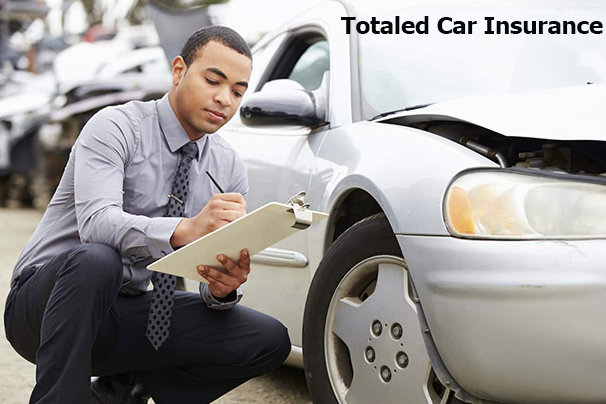What is Totaled Car Insurance? After experiencing a car accident, the situation can worsen when your insurance company deems your car to be total. This simply means that the cost of repairing the car exceeds its value or is not worth repairing. Furthermore, the last encounter with your vehicle often involves retrieving personal belongings before they’re transported to a junkyard yard.

In addition, your insurance provider may get either a replacement for the total car of similar value. Or a cash settlement equal to your car’s worth. Moreover, if you feel the deal provider is insufficient, you can get an option to contest it. However, if your car is on loan, you remain obligated to pay back the lender in full.
What is a Totaled Car?
The coverage for the damage to your vehicle depends on various factors, including the state you’re in and the party responsible for the accident. Your insurance policy or the other driver’s policy may cover the damages.
Upon filing an insurance claim, both your insurer and possibly the other driver’s insurer will appoint a claims adjuster to assess the case. Moreover, the adjuster’s primary responsibility is to decide the appropriate payout amount for the claim on behalf of their respective company.
How Does It Work?
If your car is deemed totaled, the insurance company provides a settlement amount depending on the car’s worth. Moreover, if you intend to file a claim under your collision. Or comprehensive insurance, your deductible is subtracted from the insurance payout.
For instance, if you’re involved in a car accident and claim your collision insurance, a claims adjuster examines the vehicle. If it’s determined to be a total loss, the provider offers a settlement based on the car’s value minus your collision insurance deductible.
Additionally, if your car is financed or leased, the settlement check is sent to the lender or leasing company to cover the remaining balance. However, if there’s no loan or lease, you will obtain the settlement check.
Types of Total Car Insurance Coverage
Various car insurance coverage types can assist in the event of a totaled car.
Collision and Comprehensive Insurance
Collision and comprehensive insurance are commonly bundled together. It offers protection against a wide array of situations that could result in your car being declared totaled. This includes car accidents, theft, vandalism, floods, and fire. Others include severe weather conditions, collisions with animals, and incidents involving falling objects like trees.
If your vehicle is deemed a total loss due to a covered issue under this coverage, you can file a claim with your insurer. Additionally, you will receive a settlement check, adjusted for your deductible amount.
Gap Insurance
If a totaled car is caused by an issue covered by your insurer and you are in debt on your car loan, gap insurance comes in. Gap insurance provides coverage between the settlement amount and the loan or lease balance.
To be eligible, you will need to have both collision and comprehensive coverage. Typically, it can be obtained from various sources, including your car insurance provider, car dealerships, banks, and credit unions. Additionally, separate policies are available from specialized companies such as Gap Direct.
New Car Replacement Insurance
New car replacement insurance covers a recent car of the same model only if your car is damaged by a covered accident under your policy. To be eligible, you must have both collision and comprehensive insurance, and your vehicle must meet the age and mileage criteria set by the insurance company. However, it’s important to note that new car replacement coverage generally cannot be combined with gap insurance.
Rental Reimbursement Insurance
If incidents covered by your insurance deem your car totaled, rental reimbursement insurance steps in to cover the cost of a rental car. It also covers alternative transportation methods, such as subway or bus passes.
Moreover, you can only include this coverage in your policy if you already have collision and comprehensive insurance. It proves beneficial as the process of resolving a total loss situation typically extends beyond the time required for a standard minor collision insurance claim.
Uninsured Motorist Coverage
If you lack collision insurance, uninsured motorist coverage becomes essential. In states where it’s accessible, uninsured motorist property damage (UMPD) can be used if your car is totaled by an uninsured driver.
Additionally, you may pursue legal action against the other driver. However, relying only on UMPD might not be enough, as it will only cover costs up to the predetermined limit specified in your policy.
How Insurers Determine The Worth Of A Total Car Insurance
Certain states mandate the use of NADA (National Automobile Dealers Association) for evaluating a vehicle’s worth, while others rely on the latest edition of nationally recognized value compilations, encompassing databases. When assessing the value of a totaled vehicle, several factors are taken into account:
- Make, model, and year of the vehicle
- Mileage accumulated
- Condition of the vehicle before the loss
- Selling prices of comparable vehicles in the local area
- Salvage value, which pertains to the resale value of salvageable parts and materials.
When negotiating a settlement for a totaled vehicle, it’s crucial to gather research on the vehicle’s value, including new sales data to provide documentary evidence.
Conclusion
A car is said to be totaled when the expense to get it fixed exceeds the worth of the car. Moreover, your car insurance provider might reimburse you for the sold value based on the coverage provided.
